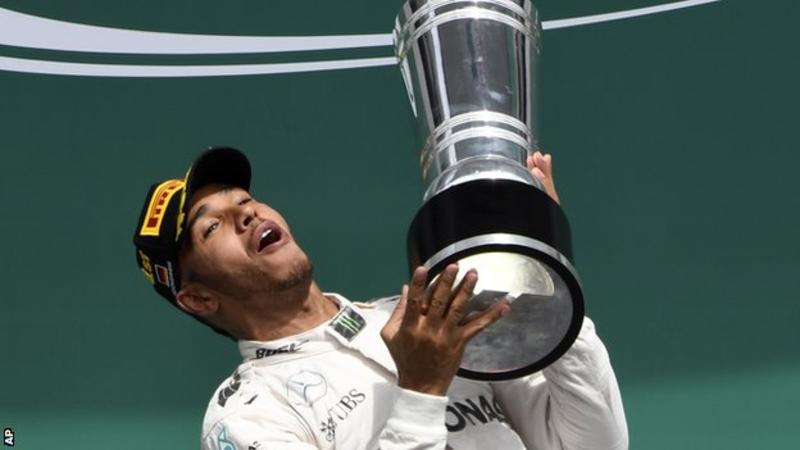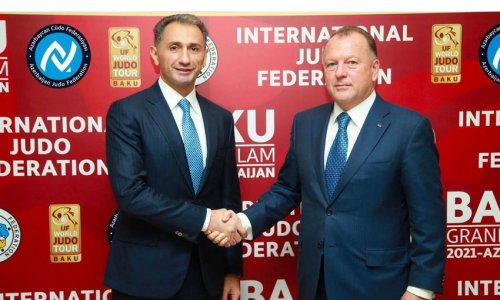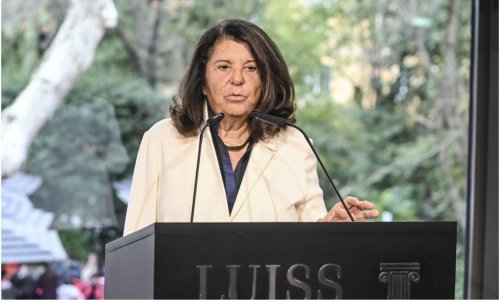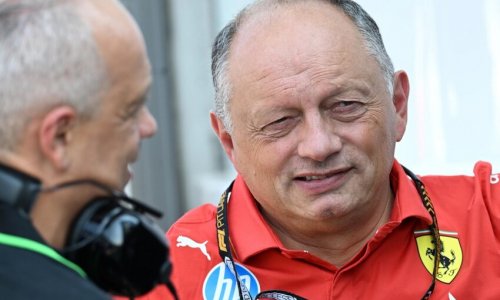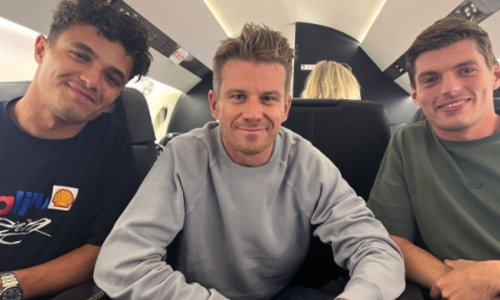The German Grand Prix was the last race before Formula 1 heads off for its four-week summer break, so it was fitting that it consolidated the two overriding trends that have emerged so far this year.
The first is that Lewis Hamilton is in control of this season regardless of the mechanical problems that afflicted him in the opening races - and which will have a knock-on effect as soon as the season re-starts at the end of August.
The second is that Ferrari have lost their way - again - and look close to implosion.
Hamilton looking unstoppable
Hockenheim was Hamilton's sixth win in seven races, a remarkable run that has seen a 62-point swing between himself and Mercedes team-mate Nico Rosberg, turning a 43-point deficit into a 19-point lead.
To anyone who has tracked the form of the competition between the two men since they became team-mates in 2013, the deficit Hamilton faced after two bad starts and then a succession of mechanical failures in the first four races looked eminently recoverable.
But Hamilton has admitted that he had his doubts. He said after winning in Germany on Sunday that back in early May he was "finding it hard to see a way through the trees".
But the last seven races have reconfirmed the inner belief he has always had that, all things being equal, he will beat Rosberg more often than not - and certainly often enough to beat him to a world championship over 20 races or so.
Rosberg on the ropes
Rosberg admitted after the race that he was facing a "tough moment". Mercedes F1 boss Toto Wolff said the German had had "a bad day", which seemed a fair way of summing it up.
Rosberg made a bad start - it happens - and lost three places, to Hamilton and Red Bull drivers Max Verstappen and Daniel Ricciardo. He then spent two stints behind the Red Bulls, without ever - after the first lap - getting close enough to try a move.
He said afterwards that was because he had lost grip in the 'dirty air' behind them.
Rosberg did eventually manage to get back to second place, thanks to a bold move on Verstappen in Turn Six right after their second pit stops. But the manoeuvre earned him a five-second penalty for forcing a rival off the track.
Rosberg said afterwards he "definitely didn't see that coming". But seeing as he got a penalty for pulling pretty much a carbon-copy move on Hamilton on the last lap of the Austrian Grand Prix last month - albeit in defence rather than attack - perhaps he should have.
He said afterwards that was because he had lost grip in the 'dirty air' behind them.
Rosberg did eventually manage to get back to second place, thanks to a bold move on Verstappen in Turn Six right after their second pit stops. But the manoeuvre earned him a five-second penalty for forcing a rival off the track.
Rosberg said afterwards he "definitely didn't see that coming". But seeing as he got a penalty for pulling pretty much a carbon-copy move on Hamilton on the last lap of the Austrian Grand Prix last month - albeit in defence rather than attack - perhaps he should have.
Rosberg is not the only competitor seeing his hopes of winning the world title this year fading rapidly in front of their eyes.
Ferrari have had a desperate month of July, going from hopes of winning races to sinking behind Red Bull to third in the constructors' championship.
Sebastian Vettel and Kimi Raikkonen were an anonymous fifth and sixth at Hockenheim, a race the team expected to mark an upturn in form because the characteristics of the track better suited their car than the last two races in Silverstone and Hungary.
After the race, Raikkonen put his finger on what was wrong: "We need more downforce to go faster and it will make a big difference to tyre life."
Vettel added that "we think we know what to do". But do they, really?
This was Ferrari's first race since they split with their technical director James Allison, a decision that mystified many in the paddock, where the 48-year-old Englishman is rated as probably the paddock's next most foremost aerodynamic design leader after Red Bull's genius Adrian Newey.
When Ferrari announced Allison's departure on Wednesday, it was assumed by some that it must be related to the tragic and unexpected sudden death of his wife in March. But if this was an issue, it was only a peripheral one.
In fact, it seems that the relationship between Allison and Ferrari president Sergio Marchionne and team principal Maurizio Arrivabene had broken down.
Marchionne has been busy reorganising the team. Sources close to Ferrari say Allison - a man who knows his mind - had disagreed with what was being done. There had been a couple of flash points over the past couple of months, and eventually it was agreed that their relationship could go no further.
On one level, that's fair enough. Marchionne is the boss - and a formidable and highly effective global business leader. He makes the big calls. If one of his senior managers does not agree with them, there is only going to be one outcome.
But the bigger question is over the wisdom of parting company with a man of Allison's abilities, what happens next and whether Ferrari really understand what is wrong and how to fix it.
Even Ferrari's director of engineering, Jock Clear, who only started working for the team in January after a year's 'gardening leave' from Mercedes, admitted that "losing someone of James Allison's calibre is not going to go unnoticed… James was very, very strong. He will be missed but that's the challenge for us".
But the problems go wider and deeper than the wisdom or otherwise of parting company with one technical leader, however good he might be.
There are questions over the general philosophy by which the team is run, the effectiveness of the F1 design group, race strategy and recruitment.
On strategy, the German Grand Prix provided the latest in a series of pieces of evidence this year that Ferrari are in a bit of a muddle. After throwing away potential victories in Australia and Canada, TV viewers were treated at Hockenheim to Vettel questioning his engineers' decisions - just as he did in Baku last month.
During Vettel's third stint, they radioed him to tell him to come into the pits. He said, no thanks, the tyres were good, he'd stay out for another couple of laps. They told him it was their only chance for an undercut. Vettel responded: "The others are miles ahead. Who am I going to undercut?" They said Verstappen. But he was eight seconds up the road, so there was no chance whatsoever of them passing him by stopping early. It was a mystifying conversation.
On car design, it has now been eight years since Ferrari produced the best car in F1 - back in 2008. Since then, all Ferraris have had an aerodynamic deficit to the best, and this one is no different.
Sources close to the team say the problem is that Ferrari lack creative design flair. This is something Marchionne has recognised and intends for his restructuring to address. But removing from a leadership post someone who embodies it seems an odd way of going about it.
Then there is recruitment. In late 2007, former Ferrari technical director Ross Brawn had talks with Ferrari about going back as team boss after a year's sabbatical.
They foundered on his desire for total control of the team, and demands for no interference from then-president Luca Di Montezemolo, which had been one of the secrets of their runaway success with Michael Schumacher. Di Montezemolo refused. Brawn walked away, joined Honda, which became Brawn, which became Mercedes, where he laid the foundations for the team's current dominance of F1.
In 2011, a few months after Ferrari had lost the title for their new driver Fernando Alonso with a catastrophic strategy call in the final race of the season, chief designer Aldo Costa was sacked. Di Montezemolo had demanded a head because the car was lagging behind Red Bull.
It later transpired that there was not much wrong with the car itself; the major difference was in Red Bull's mastery of using exhaust gases for aerodynamic effect, a technology Ferrari never mastered over the succeeding two and a half seasons it was permitted. By the time that was clear, it was too late. Costa joined Brawn at Mercedes.
In 2014, Ferrari had agreed a deal for Newey to join the team. He began to get cold feet when team principal Stefano Domenicali was forced into resigning following the team's poor start to the season. Shortly afterwards, other things happened that undermined Newey's faith that going to Ferrari was a good idea, and he decided to back away for good.
Domenicali's replacement Marco Mattiacci never gelled with Alonso, who was already having grave doubts about Ferrari's ability to ever produce a car in which he could win an elusive third title.
Alonso said he wanted to leave. Mattiacci did nothing to try to keep him; instead signing Vettel and effectively forcing the Spaniard out. The fact Alonso says he never wanted to stay is immaterial; now Ferrari had lost arguably the best driver in the world, the man who almost single-handedly had made them look respectable for the previous five years.
And now Allison has gone, too.
Vettel, it transpires, is not happy about that at all - and running the race strategy from the car is unlikely to increase his confidence either.
Up and down the paddock in Germany, many people were saying that they found it hard to see a way back for Ferrari from here. If there is one, it looks like being a long, hard road.
(BBC)
www.ann.az
Follow us !

